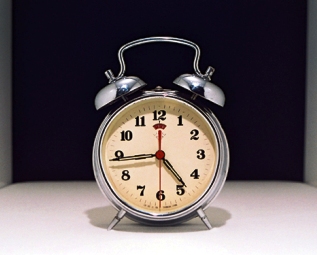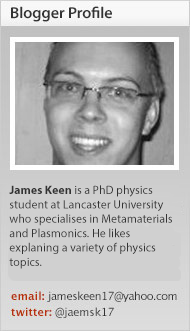« Prev Next »
We all sense that time flows. Events happen in the present then quickly pass and become nothing but memories of our past. The future is yet to be experienced. This relentless passage of time, tick followed by tock, governs our lives and helps us to make sense of the world around us.
 If only it was that simple. There are a whole host of scientific theories and philosophical arguments that portray the notion that time is just an illusion. Our own consciousness may be giving us the erroneous impression that our world plays out in accordance with a heartbeat-like rhythm.
If only it was that simple. There are a whole host of scientific theories and philosophical arguments that portray the notion that time is just an illusion. Our own consciousness may be giving us the erroneous impression that our world plays out in accordance with a heartbeat-like rhythm.
The trouble is that the laws of physics work just as well either forwards or backwards in time. For example Newton's laws of motion can work out where a ball was thrown from in the past just as accurately as where a thrown ball will end up in the future. The fundamental laws of nature seem not to tally with what we actually experience. So where does this notion of an arrow of time from past into future come from?
Whilst we consider everyday processes in terms of the passage of time, it is possible to make sense of these without the need to do so. Instead of defining the speed of light as 300 million metres per second, units of distance per time, we could say the speed of light is 240 million metres per heartbeat. Similarly, instead of Earth rotating once per day, it rotates once every 108 thousand heartbeats. Sure a heartbeat varies between individuals, but clearly we don't necessarily need the monotonous tick tock of a clock to make sense of our world.
So the flow of time seems very much to be just an illusion. Consider that we do not really observe the passing of time, but rather how the world around us is compared to how we remember it being at some point of time ago. A clock measures the duration between events just like how a ruler measures the distance between two objects. It does not measure the speed of this change from one moment to another. Only conscious observers such as ourselves register the 'flow' of time, meaning that it must be subjective rather than objective.
Physicists relate the concept of 'entropy' to any macroscopic system, for example an ice cube or a puddle of water. Entropy defines the number of possible ways to rearrange the particles in such a system without changing its overall appearence. Since a puddle of water can be made by arranging water molecules in many many more ways than is possible to get the crystalline strucure of an ice cube, a puddle of water has a higher entropy. High-entropy systems are statistically more likely to exist than those of low entropy. This is why heat, giving molecules more energy to move about, for example always causes ice to melt into liquid water. Heating up a container of water you never see it freeze into ice. These observations are obvious but give a clear understanding of physicist's beloved concept of entropy used to descibe our ever-changing world. Entropy is not just a clever idea though, it is at the heart of a fundamental pillar of phyics - the second law of thermodynamics. According to this law the entropy of the Universe can only ever increase. So perhaps this steady increase of entropy is what we perceive as the passing of time? It sounds a good idea. Unfortunately though this does not really explain the 'arrow' of time that we experience, it merely states that the entropy is expected to increase and be higher in a future time than it is now.
Perhaps the perceived passing of time is related to the mysterious quantum mechanics. Heisenberg's famous Uncertainty Principle states that nature is inherently indeterministic. The observable properties that characterise a physical system are on the atomic scale subject to uncertainty. An electron hitting an atom can scatter off in numerous different directions, each with a particular probability of doing so. Quite how a singular reality comes from the many simultaneously possible outcomes is still debated between physicists. The common stance is that the consciousness of the observer determines the outcome. In essence, we ourselves determine the nature of our reality. The notion of time flow could well be just a manifestation in our minds.
The effects of the passage of time on many key aspects of our lives - evolution, aging, memory - are still yet to be grasped. Neuroscience cannot explain why we can only remember the past but not the future. If we were able to reason away the flow of time we experience, it would have profound implications for our understanding of the Universe. The notions of past, present, and future would be thought about very differently. Science has yet to make significant progress on the question of how we perceive the passing of time, without an answer to which we cannot truly understand the world around us.
Image: Alarm Clock - Jorge Barrios (Wikimedia Commons)























